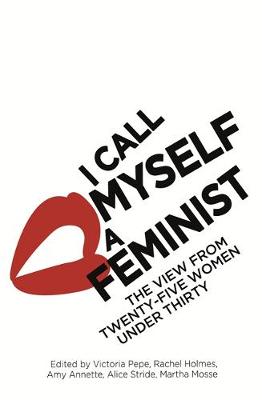I Call Myself a Feminist is an incredible book! Twenty-five personal essays from women under the age of thirty discussing why they're feminists, and what feminism means to them, with quotes, speeches, and extracts from books throughout from public figures, celebrities and authors.
I was expecting I Call Myself a Feminist to be an educational book, another book that would help me as a newbie feminist figure things out, and open my eyes to the injustices women face. It does do that on occasion, but the essays the beliefs, opinions and views on feminism, their experiences of sexism, and their reasons for identifying as feminists. Although not as educational as I first thought, it was unbelievably powerful to read of these women - some of whom are teenagers, so clued up and aware and with their eyes wide open - claiming and owning the feminist label, and what feminism means to them. In reading this book, I felt a strong sense of solidarity, and a passionate feeling of "YES!"
This might not be so surprising for those who have been calling themselves a feminist for a long while, and have been aware of the issues we face, but this book really opened my eyes to how there are so many different kinds of feminist. I don't mean that in regards to who these feminists are, but in what they think and believe. There is the common belief in equality, and how it would benefit all genders, and they all agree on the issues we face, but at the same time, they're not all talking about exactly the same thing. Their reasons for being feminists are their own, focusing on various feminist issues, and their ideas are all different. This was surprisingly liberating; we all have a common goal in mind, but there are different aspects of feminism that will speak to us.
There are a few essays I'm going to talk about in more detail, because they spoke to me. In her essay This is NOT a Feminist Rant: The Language of Silencing Women (p73), Alice Stride talks about how sexist language that undermines of puts women down - even small comments or jokes - is dangerous. It might not seem much in the great scheme of things, but sexist language can snowball into something much bigger; domestic violence. Stride discusses how Women's Aid, who she works for, has noticed a common thread in the experiences of domestic violence survivors: it started slow, with sexist language.
'Of course, I am not claiming that every sexist remark comes from the mouth of an abusive man. That is ridiculous. But we must take a stand against sexist language, no matter how small or inconsequential it may seem at the time.
Why? Because words are the fabric of everything. [...] Words are a comfort and words are a weapon. Words are the heart of life.
We must be empowered to call out the sexist whispers that make us lose our rhythm - even when it's coming from the mouths of our brothers, our friends, our partners, our fathers. And this problem goes all the way to the top - so we need to start at the bottom. If we do not address sexist language, we will not drive the change we need to stop women being viewed as second-class citizens.' (p78-79)
Amy Annette talks about how a woman's body and body language can be used as a feminist statement in her essay I Call Myself a Feminist With My Elbows (p115). This essay is absolutely wonderful, and really made me look at how I act and behave - or how I'm treated - in public. How I hunch my shoulders and bring my head down when I walk past a group of men. How I am given very little space on the tube, whether on a crowded tube and standing, or in my seat. Even on the bus, sitting on the edge of my seat, because the man next to me has his legs spread wide open, encroaching on my space. This essay covers so much more; it really got me thinking, and I am so much more aware.
In Are You a Stripper or a Shaver? (p176), Bertie Brandes brilliantly discusses how even young girls are encouraged to look and dress a certain way, and it all boils down to looking good for men. The essay starts off by talking about a Reddit forum where women were discussing when they were first looked at sexually by men, and the ages are around 11 and 12. Yes, that is horrific, but equally horrific are denim hot-pants on sale for children - which I have seen with my own eyes.
These are just a few of the essays that spoke to me, but really, all the essays are completely wonderful. They made me angry, but a passionate anger that strengthens my conviction and my desire to help bring about change. Having read this book, I'm even more proud that I call myself a feminist.
Thank you to Virago Books for the review copy.
